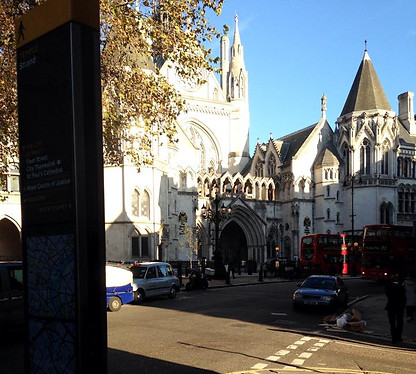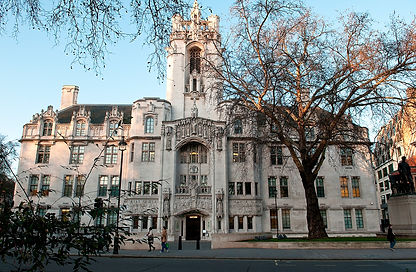
The Royal Courts of Justice (RCJ), home to the Court of Appeal and High Court.
My journey started in 2009 when I picked law as one of my A levels at college. At the time, I had no idea how big of a decision I had made. I really enjoyed the subject and quickly became involved with the department's activities. This, in turn, led me to apply to study law at university. I first developed an interest in advocacy whilst mooting at university and enjoyed doing independent legal research. Having completed a mini-pupillage (work experience) in my final year of university with a barrister in London, it simply confirmed that I wanted to pursue a career at the Bar.
I remain gripped by the nuances of the law and the significant impact very fine distinctions can have on a societal issue; those very fine distinctions can have implications on the day to day living of millions of people. For me, the law is much more than "a set of rules". It underpins society and governs the day-to-day life within that society. Further, the law (albeit a slowly-evolving creature) is in a constant state of flux, and it is subject to change. It is therefore fluid and it is malleable. It is interesting to note how decisions of the courts (through interpretation of existing legislation) and the passage of new legislation (which are often influenced by contemporary social debates) change this landscape.
My particular interest is in public law, which is concerned with the relationship between citizens and the state. I explain the concept of Judicial Review, which is a significant element of public law, in a nutshell below. You will note the following about public law:
-
It is broad in terms of the areas of law which it attaches itself to.
-
Judicial Review, and public law more broadly, are mechanisms to, in essence, control the government and ensure that it does not act in an arbitrary way. There are often very fine balancing acts undertaken by the courts.
-
The parties within public law cases vary significantly. They span the spectrum from individuals asserting basic rights, right through to large commercial bodies or movements challenging policies.
-
These cases can have a significant impact on how government policies operate, and how the powers found in legislation can be exercised. It is an intellectually stimulating area of law. The link with politics is especially interesting as the decisions and legal scrutiny by the courts can have practical implications on the general public.

Parliament Square, home to the UK Supreme Court, the highest court in the jurisdiction.
Judicial Review In A Nutshell
What is Judicial Review?
Judicial Review (JR) is the process which scrutinises the decisions made by public authorities/bodies. The process is essentially a means of testing the lawfulness of a decision that has been made. A large focus is on the fairness of the process behind the decision at the centre of proceedings, not just the decision itself. JR touches on every type of public authority decision; it is unique in that its application is broad. For example, JR proceedings can be brought on a vast range of local and central government business including: health, education, immigration, tax, human rights, planning, procurement, national security and general policy or application of statutory powers.
JR proceedings usually start life in the High Court, but if any appeals from the High Court would inevitably go to the Court of Appeal, and from there, the Supreme Court. There is an interesting mechanism whereby a case can "leapfrog" from the High Court to the Supreme Court: this is reserved to the most important of cases. A recent example would be: R (Miller) v Secretary of State for Exiting the European Union [2017] UKSC 5, which was also known as the "Article 50 litigation."
Why do we have JR?
JR heavily influences what the Government can or cannot do. In some instances, it has narrowed the powers of the Government, whereas in others it has ruled that the decision is completely lawful. It acts as means of preventing the Government from acting in an arbitrary way and abusing their role within society. JR is also a means upholding the Rule of Law.
How does JR work?
The Court will first need to decide whether or not the person claiming (the Claimant) against the decision maker (DM) has permission to bring such proceedings. Permission should be granted if the judge accepts that the Claimant has an arguable case. The Claimant must also be someone who has a 'sufficient interest' in the matter at stake, which is referred to as "standing" (see: section 31 Senior Courts Act 1981). Such applications should be brought promptly, and no later than three months of the decision that is being challenged. Should permission or "leave" to bring the proceedings be given, then the Claimant will be able to proceed with a full trial.
It should be noted that the following are not usually accepted by the Administrative Court as excuses when dealing with late applications: ignorance of the law or an unjustified delay in seeking/obtaining legal advice.
This should not be construed as legal advice and is purely educational. Readers are encouraged to seek professional legal advice for their own matters.












